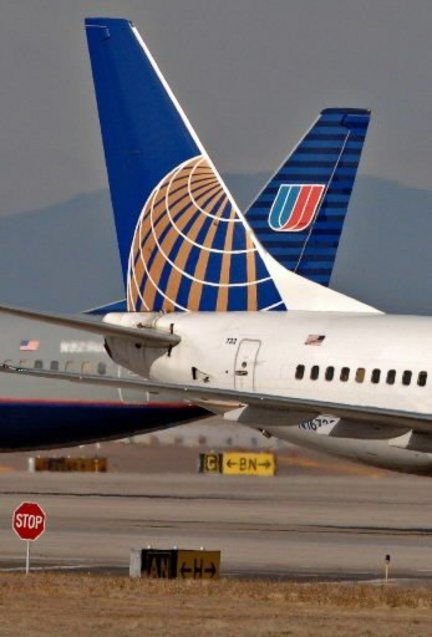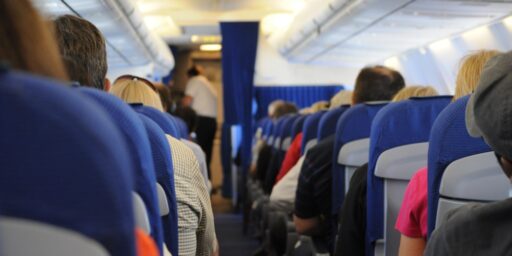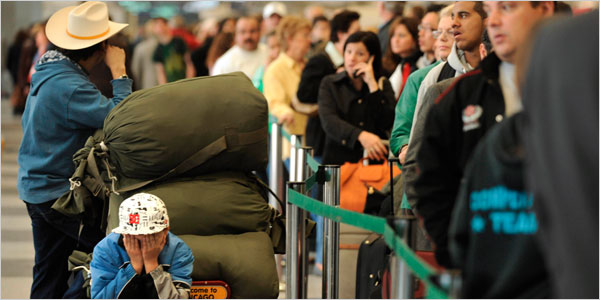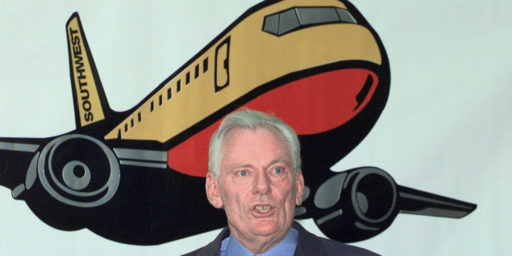United and Continental: Too Big to Fly?
 Reacting to the overnight news that Continental and United have agreed to merge, creating the world’s largest airline, satirist Scott Ott coins a new term: “Too big to fly.”
Reacting to the overnight news that Continental and United have agreed to merge, creating the world’s largest airline, satirist Scott Ott coins a new term: “Too big to fly.”
He’s kidding, of course, but in humor, as in wine, there’s often much truth. From the NYT’s non-satirical account:
The all-stock deal would form a coast-to-coast American behemoth with a leading presence in the top domestic markets, including New York, Chicago and Los Angeles, along with an extended network to Asia, Latin America and Europe. The deal was completed in a remarkably swift two weeks, and would give the airlines the muscle to fend off low-cost rivals at home and to take on foreign carriers abroad.
[…]
Combined, United and Continental have 21 percent of domestic capacity, in terms of so-called available seat miles, or one seat flown one mile. Delta has a market share of 20 percent. Globally, the merged companies would have a 7 percent market share.
Once upon a time, this sort of thing would have been subject to enormous scrutiny from federal anti-trust regulators. The merger of behemoths is rather obviously very bad for consumers. And, in this case, that’s the whole point:
For consumers, the merger could eventually result in higher prices. Though the new company does not intend to raise fares, according to people briefed on the matter, one of the rationales for airline mergers is to cut capacity. That reduces the number of seats in the industry and allows airlines to increase fares.
In addition, United and Continental will no longer be competing against each other on some routes, allowing them to save money but offering travelers fewer options.
“Airlines are struggling to find a business model that makes sense,” said Scott Sonenshein, an assistant professor at the Jones Graduate School of Business at Rice University. “Consolidation gives them more leverage. As a consumer, you will have less choices, fewer routes, higher prices and more fees.”
Oh, and it’s going to make it harder for the now-comparatively-smaller airlines to compete, possibly expending United’s advantage.
The merger would put pressure on American Airlines, which was once the market leader, but which would drop to third place. While American’s executives say they do not feel threatened by industry mergers, Wall Street analysts have been displeased by the company’s performance.
US Airways, which three weeks ago began its own merger talks with United, is now left on the sidelines, raising questions about its ability to survive as a stand-alone carrier.
Further, playing off Scott’s riff, doesn’t this merger make the new United too big to fail? There’d be one fewer carrier able to swoop in an take up their routes, after all, and more people whose jobs are directly or indirectly tied to the company’s success.
But I’m not getting any sense that this will have any real trouble going through, even with a Democratic president and in an environment that’s particularly hostile to big business and free markets. [Note: I mean this in a comparative sense. The push toward deregulation began under Jimmy Carter and has continued pretty much unabated until now. The financial crisis and global recession, not to mention the ensuing bailouts, have created huge pressures to break up megafirms and constrain the excesses most blame for the economic mess.] Yes, Jad Mouawad and Michael De La Merced note — deep in their report — that “Unlike the Bush administration’s six-month review of the Delta-Northwest deal, analysts expect a lengthier and more complex review of this merger,” there’s good reason to believe the deal will make it:
Still, in the last decade fares in the United States have declined because of pressure from low-fare airlines like Southwest Airlines and JetBlue Airways, as well as lower passenger demand. As a result, previous mergers have had a muted effect on ticket prices, especially on routes served by low-fare carriers.
Even with the steep cuts made in the last two years, airlines are still losing money, with too many seats chasing too few passengers. For much of the last decade they have suffered a succession of powerful blows — from the terrorist attacks of 9/11 to rapidly rising fuel costs and the recession. They have also been straining to keep up with low-fare competition.
That can’t continue indefinitely, though. Certainly, I’ve noted a pretty sharp increase in fares of late — precisely in the less competitive routes. DC to Atlanta remains fairly reasonable. DC to Minneapolis, though, not so much. With fewer carriers competing on the basis of price for what has become a commodity service, I expect the trend to continue.





There’s two sorts of competition among airlines: routes and schedules and within those price. For domestic air travel I’d need to see what routes the merged airline would propose to eliminate and which they’d retain before I could make a judgment on allowing the merger to go through. Continental’s routes are here. United’s are here.
There are lots of destinations in the South and West that Continental serves that United doesn’t. A merged Continental-United might actually be more competitive with Delta than the two airlines are separately.
The merged airline would have distinct benefits in international routes. Continental serves destinations in Latin America that United doesn’t and the combined airline could actually give U. S. passengers better access to those destinations. A good thing, in my view.
I favor sweeping reforms in how routes and schedules are allocated among airlines but that’s a different subject.
Dunno about that. The wife and I fly Southwest exclusively, and it seems to be doing OK. So OK, in fact, that it was just fined $200,000 for bumping. That’s a matter of too many SW passengers chasing too few seats, right? Bumping aside (which isn’t cool), it does seem to have some pretty effective marketing going. I mean with other airlines charging for your bags, SW has gone all out telling you it will not charge you. That’s brilliant judging from the conversations I heard in the boarding line last week.
BS, and this from the guy who pushed “Bush’s 3rd term.”
Obama is to the right of Nixon on business and markets. The only way to make him “hostile” is to push yourself out to an extreme, far beyond any past president. Either that, or it is just to buy into the mania.
It’s not a comment on Obama but on the environment. All but the most die-hard libertarians want major reforms after the banking mess.
Perhaps, but the “hostile” framing really yields status quo to the die-hard libertarians.
Heck, I believe the most extreme version of 2010 financial regulation is still freer and looser than Regan’s America.
Coincidently, an interesting bit today:
And? Nixon was abominable when it came to free markets, imposing wage and price controls. So Obama’s somewhere to the right of abominable. Let’s eat the minstrels.
Oh? Because…? But hey, the biggest behemoth with the purest heart on the face of the earth is going to watch out for us little people, so we got that going for us.
Nixon is just a nice place-keeper for where the anti-communist war-horses used to be. An illustration of how times change.
Even Adam Smith acknowledged the need for trust-busting. People of the same trade seldom meet together, even for merriment and diversion, but the conversation ends in a conspiracy against the public, or in some contrivance to raise prices” and all that.
Capitalists without competition aren’t really capitalists.
I don’t think this will be necessarily bad for consumers. The deal is being reported in the UK as in part consolidation ahead of the expansion of the EU-US open skies agreement that will let European airlines fly internal US routes and vice versa. I think there’s now an agree draft agreement on that and it’s expected to be approved.
Hopefully that will lead to more competition and better deals for consumers.
Shaun
I’m laughing at this thread, and as usual, odograph’s ignorance.
As your friendly private equity guy, and a guy who has first hand, up close and personal interaction with the Obama Administration’s current anti-trust stance (Think sitting across the table from FTC lawyers and economists discussing a real live transaction) let me tell you the notion that this Administration hasn’t heightened the anti-trust environment exponetially is ludicrous.
And in anticipation of the usual weak minded scoffing at “anecdotal” evidence, let me tell you that some of the finest (and highest price) talent in the field for both buyer and seller report that in “the 30 years of doing this I’ve never seen a more hostile anti-trust environment.”
But who am I, or they, to contradict noted anti-trust authority odograph, er john personna??
By the way, is anyone familiar with the standard the FTC and DoJ use to determine if a merger/acquisition is anti-competitive?
James, the airline industry is consolidating because the business models haven’t been working very well and there is enormous excess capacity. Two airlines merging in and of itself doesn’t mean that there is monopolitic collusion taking place. In fact, there merger argues against that.
It is very much true that some consumers may find themselves with fewer travel options or higher prices, but that may be nothing more than a reaction to fewer people flying and ever greater regulatory costs rather than any nefarious practices by the vendors. How much more inconvenienced might these consumers be if Continental or United goes belly up? Or worse, if United and Continental go belly up?
The weird thing Drew, is that you almost always argue from your authority, I never do. I try to write posts that stand on their own, or are based on data source I provide (link in).
That’s probably why you make this strange, to me, statement at the end:
Are you hung up on my name because you are worried about me, as an authority? You, of the first name only?
Maybe you should put up or shut up. What’s your last name?
(Note for the slow, one reason why I can operate with a pseudonym is that I don’t claim authority. I just write stuff that I hope makes sense on its own.)
Keep hope alive!
I can take stuff like that in good humor charles, but the trick for anyone who wants to battle my ideas is to battle the ideas.
If they attack me, I’ll just assume I’m dealing with an emotional cripple.
Speaking of put up or shut up.
You are talkin’ pure crap here, Johnny Boy. And now you are trying to dodge the issue.
You don’t have a clue about the current antitrust environment. Your comments were silly. You know it and I know it.
Charles:
“Two airlines merging in and of itself doesn’t mean that there is monopolitic collusion taking place.”
I’ll get back to you on that.
I’m waiting for our “battling idea” anti-trust sage to inform us on current DoJ/FTC guidelines.
But I’m not holding my breath.
I spent 20 plus years in the industry,then retired early. From just before deregulation to 2002. I profited greatly both professionally and financially from Jimmy’s and Teddy’s little screw up.
But trust me, deregulation is a major…major “—-up”. The true ramifications of which, won’t be felt for about another 10 years. And it will be even more unpleasant than the current service.
We are on the way to having only two zombie, too big to fail airlines, competing to give the worse service. My solution was,to buy my own airplane and not deal with it. What will yours be?
Can you show me where I even talked about anti-trust above?
What a psycho. I talked about Obama, Financial Regulation, and Nixon.
Jeez, do you think conversations between adults work this way? That one guy asks rubric little line-liners, and other fools line up to answer them? Is there a special dice that goes with that?
If I ever get this bad somebody stage an intervention.
Pathetic, JP.
James’ post was specifically about anti-trust and how this merger might be viewed by the authorities in the current Obama driven regulatory environment. I believe his exact words were: “Once upon a time, this sort of thing would have been subject to enormous scrutiny from federal anti-trust regulators.” And then: “But I’m not getting any sense that this will have any real trouble going through, even with a Democratic president and in an environment that’s particularly hostile to big business and free markets.”
You called him on that. “BS” I think you said…and Nixon and all that. Your words, not mine. But you called it wrong, because you have no understanding of what’s really going on in Washington right now.
You just didn’t expect someone to come along and call you out. In point of fact the current anti-trust environment is incredibly difficult. A huge shift occurred upon Obama’s election.
It is apparent you don’t even understand the basic concept here. Anti-trust policy is designed to differentiate between anti-competitive transactions and efficincy producing transactions. Fed rejection of efficiency producing mergers or acquisitions is by definition anti-business and diseconomic.
So now you squirm, raising every diversionary argument you can come up with.
Classic.
In other words, you didn’t figure out until just now what I was talking about.
Not anti-trust.
I responded to James’ offhand comment about free markets. And he and I were on the same page in the next exchange, about the “banking mess.”
You know, one big red flag when you have to deal with a nutjob is that they don’t actually respond to what you say. They respond to their fantasy, what they expected you to say. When you break that plot they can’t quite deal with it, other than to lash out.
If I did want to learn about anti-trust now, I’d probably google and read some stories. I wouldn’t trust some blowhole with a first name only, who knows a guy, who tells him things.
Example:
That certainly doesn’t surprise me, that they’d try a change in direction. But I really doubt that your secret friend is right, and they’ve already reversed 30 years of precedent.
BTW, this was a classic example of a crazy man making up arguments:
Where the heck did I talk about anti-trust again?
Ah, here’s a good reference for those who do want to learn about anti-trust changes, without depending on the anonymous and crazy:
The Antitrust Review of the Americas 2010
From that:
Kind of what we’d expect.